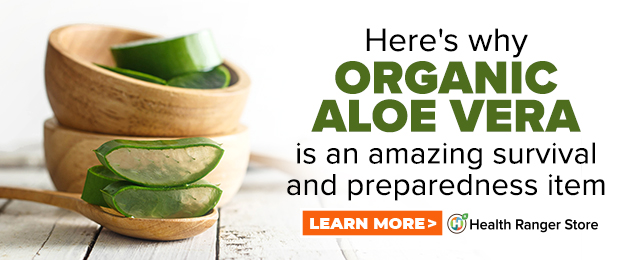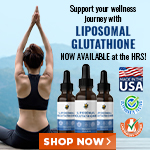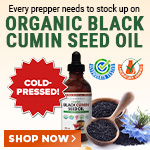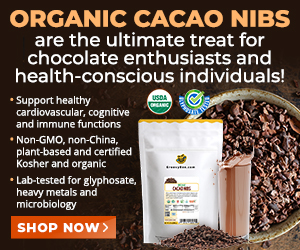
Cancer risk increases after kidney graft
Tuesday, January 02, 2007 by: Jerome Douglas
Tags: cancer risk, organ transplants, health news
- Mainstream media finally admits lockdowns were a disaster
- Zuckerberg's Meta: A double game on China and censorship
- The Health Ranger releases “Vaccine Zombie” song and music video, using AI-animated zombies for the music video
- When the MASS MEDIA is backing your movement, you are NOT the "RESISTANCE"
- Modern science uncovers brain-boosting power of ancient spice coriander and its key compound linalool
- Ballot drop boxes set ablaze in Oregon and Washington, prompting security concerns ahead of election
- Death by CHEMICAL RESTRAINTS: How Australia’s elderly and vulnerable were SEDATED into early graves during the COVID scandal
- Israeli soldiers accused of even more torture and abuse in the West Bank
- Jimmy Kimmel ‘illegally’ tells Trump voters they can wait until Friday
- Migrants are taking advantage of recent hurricanes to scam residents and loot their homes
- Former horse rancher and 6,000 other plaintiffs are suing Syngenta after paraquat exposure led to Parkinson's Disease
- When dissent becomes a crime: The war on political speech begins
- Sermon 30: How Jesus reveals Caesar’s FAKE CURRENCY and FALSE AUTHORITY
- Peter Rost exposes Big Pharma corruption in his book “The Whistleblower: Confessions of a Healthcare Hitman”
- OpenAI whistleblower who dissented against how the company trained ChatGPT found dead
- Russia clarifies what its ‘red line’ is with the U.S., NATO, Europe, as world inches closer to war
- Pilots report mysterious lights 'moving at extreme speeds' across Oregon skies
- Tiny plastic beads could revolutionize energy generation
- California's social media censorship law struck down: A victory for free speech or a threat to online safety?
- The Health Ranger releases “Vaccine Zombie” song and music video, using AI-animated zombies for the music video
- EPA advisor admits the agency is funneling billions to climate groups ahead of Trump’s return to White House
- Former horse rancher and 6,000 other plaintiffs are suing Syngenta after paraquat exposure led to Parkinson's Disease
- Modern science uncovers brain-boosting power of ancient spice coriander and its key compound linalool
- Congratulations to the FULLY UNVACCINATED as you resisted the COVID-19 PROPAGANDA MACHINE fueled by over $100 BILLION
- Michigan sheriff announces criminal investigation into 2020 election crimes, Dominion Voting Systems
- Florida takes a stand: DeSantis proposes permanent ban on mRNA vaccine mandates
- Ballot drop boxes set ablaze in Oregon and Washington, prompting security concerns ahead of election
- Migrants are taking advantage of recent hurricanes to scam residents and loot their homes
- Israeli soldiers accused of even more torture and abuse in the West Bank
- Peter Rost exposes Big Pharma corruption in his book “The Whistleblower: Confessions of a Healthcare Hitman”
- The pandemic as a tool for INDOCTRINATION: Understanding “The Indoctrinated Brain” by Dr. Michael Nehls
- House Intelligence Committee calls for the ARREST and PROSECUTION of Dr. Anthony Fauci
- Russia warns citizens against traveling to the United States, Canada and the European Union
- Jena Griswold “breaks” 2024 election in Colorado: Results will be 100% non-certifiable, warns Patrick Byrne
- Sermon 30: How Jesus reveals Caesar’s FAKE CURRENCY and FALSE AUTHORITY
- Trump administration takes on global censorship: A new frontier for free speech advocacy
- EPA advisor admits the agency is funneling billions to climate groups ahead of Trump’s return to White House
- RFK Jr. clears key hurdle: Sen. Susan Collins backs controversial HHS nominee, signaling a new era for health policy
- Congratulations to the FULLY UNVACCINATED as you resisted the COVID-19 PROPAGANDA MACHINE fueled by over $100 BILLION
- The Health Ranger releases “Vaccine Zombie” song and music video, using AI-animated zombies for the music video
- Global leaders unite to clamp down on “misinformation” with UN-backed Cascais Declaration
- DIRTY VACCINES: Dr. Anthony "Fraudulent" Fauci, King of the Covid scamdemic, admits "We don't do placebo trials on vaccines"
- Fake "CLIMATE CHANGE" will continue to devastate any regions the globalists and ruling elite want to purchase at a discounted price
- Mint: The ancient herb that refreshes, soothes and heals
- Trump administration takes on global censorship: A new frontier for free speech advocacy
- South Korean banks halt silver bar sales amid global and domestic uncertainty
- Democrats cry as “liberal supply chains” are wiped out and their favorite multi-billion dollar money machine is shut down
- The pandemic as a tool for INDOCTRINATION: Understanding “The Indoctrinated Brain” by Dr. Michael Nehls
- PBS shutters DEI office in wake of Trump’s executive order
- Ex-FBI Chief EXPOSES disgraceful government coverups of Oklahoma City Bombing, Kennedy assassinations, 9/11 WTC, and "Terrorism" as plot to destroy Constitution
- “Cancer Gag Act” threatens farmers’ rights and public health: A dangerous push for corporate immunity
- Federal judge backs Trump's mass firings, clearing path for government downsizing
- Trump's impressive political comeback against all odds makes headlines around the world
- Deep State Power Grab? Corporate Transparency Act threatens nonprofits and small businesses – Andy Schlafly discusses potential impacts with Mike Adams
- Red Cross issues warning to stop blood plasma donations from vaccinated people
- Scientists confirm: GENIUS brain function can be spontaneously unleashed in humans without any apparent cause
- HYSSOP: What research reveals about the health benefits of this ancient holy herb
- EPA advisor admits the agency is funneling billions to climate groups ahead of Trump’s return to White House
- Two containers with completed ballots fall out of truck in Florida
- Fully vaccinated about to see “tsunami” of illness and death, warns virologist
- Today I asked our AI language model “Neo” about which phytonutrients or phytochemicals can block the spike protein related to SARS-CoV-2 … Here is what it answered…
- Global leaders unite to clamp down on “misinformation” with UN-backed Cascais Declaration
- DATA: England’s vaccinated population had close to one million deaths in 23 months; unvaccinated population had less than 61,000 deaths over the same period
- BREAKING: 2025 NDAA authorizes mandatory military draft of WOMEN across America… as Pentagon pursues global NUCLEAR war with both Russia and China at the same time
- ENGINEERED FAMINE: Oregon starts SHUTTING DOWN small farms “to protect the people”
- Michael Yon warns of a ZIONIST TAKEOVER in Trump’s second administration
- Ozempic and Wegovy weight loss drugs are injectable LIZARD VENOM PEPTIDES that may unleash a devastating wave of organ failure… side effects align with symptoms of SNAKE BITES
- BOMBSHELL: DNA testing kits are a SCAM to develop ethnic-specific bioweapons
- NASA admits that climate change occurs because of changes in Earth’s solar orbit, and NOT because of SUVs and fossil fuels
- These 13 countries just signed an agreement to engineer a global FAMINE by destroying food supply
- Careless Whisper: AI-powered transcription tool being used by hospitals found to invent chunks of text no one ever said
- Coriander seeds: Ancient medicine backed by modern science
University of New South Wales' Dr. Vajdic reported her findings in the Dec. 20 issue of the Journal of the American Medical Association. Her research indicated that following transplantation, there was a significant increase in risk of cancer.
Immune suppression after transplantation is recognized as a risk factor for non-melanoma skin cancer, non-Hodgkin's lymphoma, and Kaposi's sarcoma, but Dr. Vajdic and colleagues said it had been assumed that there was no increase in other cancers. Dr. Vajdic noted that this issue had never been studied in a large population with long-term follow-up.
There were 1,236 observed cancers in patients who received kidney transplants, excluding non-melanoma skin cancer, non-Hodgkin's lymphoma, and Kaposi's sarcoma. The team only expected to find 378 cases.
The study performed by Dr. Vajdic was limited by some specifics, such as the need to retrospectively define the "period before transplantation." This may have caused an underestimation of the incidence of cancer, because some patients may not have been referred for transplant because of their cancer history. In addition, the heightened cancer surveillance in the transplant population may also have introduced bias.
###
Cancer risk at FETCH.news
Get independent news alerts on natural cures, food lab tests, cannabis medicine, science, robotics, drones, privacy and more.
Take Action: Support Natural News by linking to this article from your website
Permalink to this article:
Embed article link: (copy HTML code below):
Reprinting this article:
Non-commercial use OK, cite NaturalNews.com with clickable link.
Follow Natural News on Facebook, Twitter, Google Plus, and Pinterest
Science News & Studies
Medicine News and Information
Food News & Studies
Health News & Studies
Herbs News & Information
Pollution News & Studies
Cancer News & Studies
Climate News & Studies
Survival News & Information
Gear News & Information
News covering technology, stocks, hackers, and more



"Big Tech and mainstream media are constantly trying to silence the independent voices that dare to bring you the truth about toxic food ingredients, dangerous medications and the failed, fraudulent science of the profit-driven medical establishment.
Email is one of the best ways to make sure you stay informed, without the censorship of the tech giants (Google, Apple, Facebook, Twitter, YouTube, etc.). Stay informed and you'll even likely learn information that may help save your own life."
–The Health Ranger, Mike Adams













































